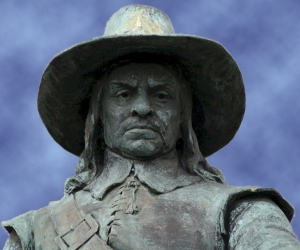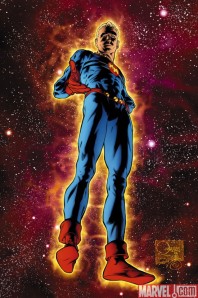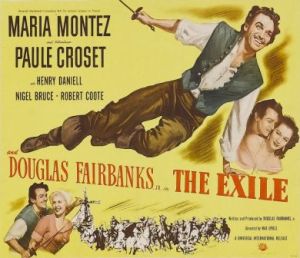Jerry Siegel stole Superman’s 1938 tagline “champion of the oppressed” from Douglas Fairbanks. The silent film star’s 1920 The Mark of Zorro opens with the intertitle: “Oppression—by its very nature—creates the power that crushes it. A champion arises—a champion of the oppressed—whether it be a Cromwell or someone unrecorded, he will be there. He is born.”
You can quibble with the superheroic logic (is oppression always self-defeating?), but the word that made me pause (literally, I thumbed PAUSE on my remote) is “Cromwell.” As in Oliver Cromwell, the man who chopped off King Charles’ head in 1649 to become Lord Protector of England until his own, kidney-related death a decade later (after which Charles’ restored son dug up his body and chopped off his head too). All perfectly interesting, but what, you may ask, does that have to do with Zorro?
Johnston McCulley doesn’t mention Cromwell in The Curse of Capistrano, the All-Story pulp serial Fairbanks adapted. Some American Fairbanks trace their name back to the Puritan Fayerbankes, proud followers of Cromwell since the 1630s, so maybe Douglas was just carrying on family tradition. Except The Mark of Zorro isn’t the first Cromwell mention in superhero lore.
George Bernard Shaw lauds him in “The Revolutionist’s Handbook,” an appendix to his 1903 Man and Superman, the play that first gave us the English ubermensch. Shaw (or his alter ego John Tanner, the Handbook’s fictional author) declares Cromwell “one of those chance attempts at the Superman which occur from time to time in spite of the interference of Man’s blundering institutions.” A devout eugenicist, Shaw/Tanner longed for a nation of supermen, “an England in which every man is a Cromwell.”
By the time Siegel was copying Fairbanks’ intertitles in the 30s, “Cromwell” and “Superman” were synonyms. Biographer John Buchan (better known for his Hitchcock adapted Thirty-Nine Steps) called him “the one Superman in England who ruled and reigned without a crown.” P. W. Wilson extended the comparison to modern times, ranking England’s Prime Minister Stanley Baldwin “among the supermen,” and likening his overseeing of Edward VIII’s abdication to Cromwell’s regicide.
Alan Moore extends the superhero connection even further. In a 2007 interview, Moore (like Shaw’s John Tanner) identifies himself as an anarchist (“the only political standpoint that I could possibly adhere to would be an anarchist one”) and so longs for a society with “no leaders” (he’s literally anti “archons”). He traces his inspiration to 17th England when underground religious movements were espousing the heretical view that all men could be priests, “a nation of saints.” And, Moore explains, “it was during the 17th century that, partly fueled by similar ideas, Oliver Cromwell rose up and commenced the British civil war, which eventually led to the beheading of Charles I.”
Guy Fawkes (inspiration for Moore’s V for Vendetta) had tried to kill Charles’ father, King James, a half century earlier, but Guy was no Oliver. Moore revels in the thought of headless monarchs, but Buchan celebrates the executioner, “an iron man of action” with “no parallel in history.” Cromwell ignored his own council of commanders during the civil war and, after making England a republic, he ignored Parliament too. “It was too risky to trust the people,” writes Buchan, “he must trust himself.”
That’s the ubermensch Shaw adores. Not a champion of the oppressed, but a champion of the self. And it’s a quality still central to every superhero, all those iron men of action who trust only themselves, ignoring and sometimes defying law enforcement to maintain their own sense order. Zorro opposed the colonial regime of a corrupt California governor. Cromwell fought for religious freedom against a tyrant who persecuted anyone who did not conform to the Church of England.
But what happens after oppression is crushed? Fairbanks’ Zorro retires into happy matrimony. McCulley rebooted his Zorro for more oppression-opposing adventures—inspired by Baroness Orczy’s Scarlet Pimpernel, an iron man of action dedicated to rescuing noble necks from the kind of execution blade Cromwell wielded. Once enthroned, the Lord Protector imposed his own, literally Puritanical order on England. He closed taverns, chopped down maypoles, outlawed make-up, fined profanity, and, as a real life Burgermeister Meisterburger, cancelled Christmas.
When Alan Brennert wrote his 1991 graphic novel, Batman: Holy Terror, he kept Cromwell on the throne another decade, creating an alternate universe in which the U.S. is an English commonwealth run by a corrupt theocracy. It seems Supermen in charge are not such a good thing for the common man. Look at Garth Ennis’ The Boys (2006), or Mark Waid and Alex Ross’ Kingdom Come (1996), or Mark Gruenwald’s Squadron Supreme (1986), or, best yet, Alan Moore’s Marvelman (AKA, Miracleman, but let’s not go into that right now). I bought No. 16 from my college comic shop in 1989, a year after I graduated college. It’s the last issue before Neil Gaiman took over and I stopped reading the series. Gaiman is great, but the story was over. Marvelman has rid the world of nuclear warheads, money, global warming, crime, childbirth pain, and, in some cases, death. He’s not king of the world. He’s its totalitarian god.
Marvel Comics is re-releasing and completing the series now, and, what the hell, I’ll probably pick up where I left off. But my worship of Moore is long over. I considered him the reigning writer of the multiverse for decades, but his rule grew increasingly idiosyncratic and, less forgivable, dull. His last Miracleman, “Olympus,” is a tour of the dystopic future. From Hell offers similar tours, literally horse-drawn, which, while aggressively non-dramatic in structure, basically work. But my heart sunk when the third volume of The League of Extraordinary Gentleman devolved into a balloon ride over yet more of Moore’s meticulously researched esotoria. Yes, the dream-like Blazing World is ripe with 3-D nudity, but this is no way to conclude a plot. When Promethea, my favorite of all Moore creations, plunged down the same rabbit hole, I couldn’t make myself keep reading. Moore was running his own imprint at this point, America’s Best Comics, with no Parliament or War Council left to ignore, and no corrupt tyrant to oppose.
Heroes need oppression. Even Fairbanks’ son, Douglas Jr., knew that. After his father’s death, he wrote, produced, and starred in The Exile, a 1947 swashbuckler about Charles II, the son of the king Cromwell beheaded. He hides out on a Holland farm and falls in love with a flower monger while battling Cromwell’s assassins before Parliament calls him back to his throne. It’s a happy ending made happier by the fact that Fairbanks didn’t follow it with a sequel. After Charles started waging wars and suspending their laws, Parliament regretted their invitation.
Every Cromwell—by his very nature—creates the Cromwell that crushes him.




“Moore was running his own imprint at this point, America’s Best Comics, with no Parliament or War Council left to ignore, and no corrupt tyrant to oppose ”
That’s isn’t really true later on, since Moore starts engaging with the war in Iraq and 911 towards the end of Promethea. The final art in Promethea (once the Kaballah stuff is over) is terrific IMO.
Thanks, pallas. I’ve heard the series gets considerably better after that middle dip, and it sounds like I need to make myself read it and, most likely, enjoy it.
Common mistake, but that’s Douglas Fairbanks JUNIOR pictured in the poster. Senior wrote all of his films under the name Ullman Thomas, so we can credit that safely to him and his own significant contributions to the Zorro legend.